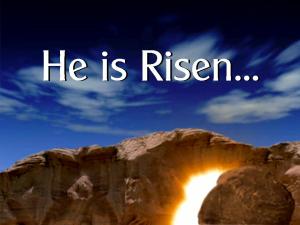 Today is Easter Sunday (also known as Resurrection Sunday), and I’m reminded of what Paul stated in 1 Corinthians 1:18:
Today is Easter Sunday (also known as Resurrection Sunday), and I’m reminded of what Paul stated in 1 Corinthians 1:18:
For the message of the cross is foolishness to those who are perishing, but to us who are being saved it is the power of God.
In an article published on April 12, 2020, titled “Resurrection Power,” by Jim and Janean Reish, published on their ministry blog, “A Deeper Word: Going Beyond Surface Christianity,” they open their article with the following words:
That I may know him, and the power of his resurrection… Philippians 3:10 (KJV)
Jesus said that He is the resurrection and the life. To know Jesus is to know resurrection and life, because that is what He is. Because He is the resurrection and the life, He can raise us up and give us life. The resurrection of Jesus shows that there is no case that is hopeless and no problem that God cannot and will not fix…. (Click here for the quote source, along with the rest of the article.)
In an article published by Rick Renner Ministries titled, “The Cross–Foolishness or the Power of God,” it opens with the following:
Since Jesus rose from the dead, different people have responded differently to the preaching of the Cross. Some reject it, while others receive the message by faith and thus experience the power of God. Paul referred to this dichotomy of response when he wrote, “For the preaching of the cross is to them that perish foolishness; but unto we which are saved it is the power of God” (1 Corinthians 1:18).
The word “foolishness” in this verse is from the word “moria,” which means “foolish, stupid, or unintelligent” and describes “unacceptable behavior, thought, or speech.” From this word “moria,” we derive the word “moron.” To the Greek and Roman mind, to believe in Christ and in His Cross alone as the way to salvation was the belief of a moron. This kind of exclusive and “narrow” behavior, thought, or speech was simply unacceptable. When confronted with the message of the Gospel, a pagan of that time would have forthrightly exclaimed, “It is stupid, unintelligent, and unacceptable to believe that Jesus is the only way to God.”
Paul continued in First Corinthians 1:18, saying, “…Unto we which are saved it is the power of God.” The word “power” is the Greek word “dunamis,” which is most often used in ancient literature to depict “military might or the ability to conquer.” In fact, it is used 210 times in the New Testament to denote “strength and conquering ability.” For those who don’t believe in Jesus and have never experienced the delivering and conquering power of the Gospel, this message may seem to be foolishness. But those who have repented and have entered into covenant with Jesus Christ know the delivering, conquering power of these mighty words. It is no foolishness to the redeemed—it is the lifesaving power of God! (Click here for the quote source, along with the rest of the article.)
So what is “the power of God” and how can we rely on it? GotQuestions.org gives us the answer to that question:
We often hear about the power of God, and Scripture is full of examples of His power in action. He is “the great God, mighty and awesome” (Nehemiah 9:32). We are taught to rely on His great power to get us through trials such as a job loss, a sticky divorce, bankruptcy, hateful persecutions, a debilitating illness, or the loss of a loved one. Learning to rely on the power of God is part of living the Christian life.
The apostle Paul gives us a glimpse of the power of God when he writes of “his incomparably great power for us who believe. That power is the same as the mighty strength he exerted when he raised Christ from the dead and seated him at his right hand in the heavenly realms, far above all rule and authority” (Ephesians 1:19–21). The Greek word translated “great” is “megethos,” which means “strong” or “great,” and it appears only here in the New Testament. This word obviously wasn’t sufficient for Paul to express God’s great power, so he adds the word “incomparably” or, in Greek, “hyperballon,” related to a verb that literally means to “throw beyond the usual mark” or to “excel or surpass.” So, the full idea of the expression “hyperballon megethos” is that of a power beyond measure, a super-abounding or surpassing power, power that is “more than enough.”
Greek authorities tell us that, because the term “megethos” is found only here in all the New Testament, this reflects the outreach of Paul’s mind when he sought to describe the power of God. Paul was “stretching at the seams” as he tried to describe the power of God and pour more meaning into his words. What Paul is really telling us is that God’s power exceeds or surpasses everything—it is unimaginable power. God spoke the universe into existence, raised Jesus from the dead, and “placed all things under his feet and appointed him to be head over everything for the church” (Ephesians 1:22), and He has power far beyond any possibility of being measured. Paul simply could not say enough about the greatness and majesty of God, and he had difficulty finding the words to express his thoughts about the power of God.
 How can we learn to rely on the enormous power of God? First of all, we choose to remember the things that God has done: “Look to the Lord and his strength; seek his face always. Remember the wonders he has done, his miracles, and the judgments he pronounced” (Psalm 105:4–5). Every miracle recorded for us in the Bible should give us encouragement that His strength is more than enough for our need.
How can we learn to rely on the enormous power of God? First of all, we choose to remember the things that God has done: “Look to the Lord and his strength; seek his face always. Remember the wonders he has done, his miracles, and the judgments he pronounced” (Psalm 105:4–5). Every miracle recorded for us in the Bible should give us encouragement that His strength is more than enough for our need.
Also, to rely on the power of God, we must learn to cease trusting in our frail efforts and hand our resources over to the One who can do anything. God’s power is perfected in our weakness (2 Corinthians 12:9). The disciples were at their wits’ end trying to figure out how to feed the 5,000; it was not until they brought the small amount of food they had to Christ that anyone was fed. Joshua stood helpless before the walls of Jericho, but he learned to trust the Lord’s battle plan. Zerubbabel faced the daunting task of rebuilding the temple, and God reminded him that the work would be done “not by might nor by power, but by my Spirit” (Zechariah 4:6).
Prayer is a vital part of relying on the power of God, as we pray, “Thy will be done” (Luke 11:2, KJV). Jesus said, “Ask, and it will be given to you; seek, and you will find; knock, and it will be opened to you. For everyone who asks receives, and he who seeks finds, and to him who knocks it will be opened” (Matthew 7:7–8). It was after a prayer meeting in the early church that “the place where they were meeting was shaken. And they were all filled with the Holy Spirit and spoke the word of God boldly” (Acts 4:31). It was during a prayer meeting that Peter was miraculously released from prison (Acts 12).
The resurrection of Jesus certainly demonstrates the great power of God and is the great hope of all believers. Because He lives, we will live also (John 14:19). Peter said we have been “born again to a living hope through the resurrection of Jesus Christ from the dead, to obtain an inheritance which is imperishable and undefiled and will not fade away” (1 Peter 1:3–4, NASB). No matter what happens in this world, we have the power of God and Jesus’ resurrection; the Lord will grant us an inheritance and sustain us through eternity. We “through faith are shielded by God’s power until the coming of the salvation that is ready to be revealed in the last time” (verse 5). As Martin Luther sang during the Protestant Reformation, “The body they may kill; / God’s truth abideth still.”
No matter how weak or ill-equipped we may at times feel, we can rely on the power of God. We have the assurance that God “is able to do immeasurably more than all we ask or imagine, according to his power that is at work within us” (Ephesians 3:20). We have confidence that ultimately God will accomplish His good in our lives: “In all things God works for the good of those who love him, who have been called according to his purpose” (Romans 8:28). (Quote source here.)
Austen C. Ukachi, pastor and contributor at The Guardian/Nigeria, writes the following in his article published in their Sunday Magazine titled, “The Power of His Resurrection,” on April 12, 2020:
Christianity was founded on power and has thrived thereafter through the display of God’s power (Gen.1:1-3). Hebrews 1:3 states that God upholds all things by the word of his power. On this Easter Sunday, it is very appropriate we reflect on the place of God’s power in the resurrection of our Lord Jesus Christ.
2 Timothy 2:8 enjoins us to remember that Jesus was raised from the dead. Why is this necessary that we remember that Jesus was raised from the dead?
One, remembrance strengthens our faith. At communion we remember his death (1 Cor.11:23-26). In Matthew 28:6, when Christ rose from the dead, an angel testified to the women who came to the tomb thus, “He is not here; for He is risen, as He said. Come, see the place where the Lord lay” (Matthew 28:6 NKJV). This means there was evidence that Jesus rose from the dead. When we remember his resurrection we are celebrating the power that raised him from the dead.
Two, remembrance gives us hope. Remembrance reminds us of the victory of Calvary. 1 Corinthians 2:8 reads, “which none of the rulers of this age knew; for had they known, they would not have crucified the Lord of glory.” (I Corinthians 2:8 NKJV). The death and resurrection of Jesus gave birth to the Church and its two billion adherents today. His resurrection brought unquantifiable blessings to the Church and the world.
Three, remembering the resurrection of Christ gives us hope that we shall be raised with him in future even after our death. Paul wrote, “knowing that He who raised up the Lord Jesus will also raise us up with Jesus, and will present us with you” (II Corinthians 4:14; 1 Cor.6:14; 1 Cor.15:20)
Four, his resurrection reminds us that he was raised by the Spirit of the Father, and that same Spirit dwell in us and would give life to our mortal bodies (Romans 8:11).
This Easter Sunday, we cannot but reflect on the mystery behind the power that raised Jesus from the dead. That power is the same today and forever, it has not lost its power. Let us consider some of the outworkings of this power over time.
God displayed his power at creation, and the whole of creation attest to the power of God (Gen. 1:1-3; Romans 1:20).
God challenged Abraham to believe in his power to give him a son from his wife Sarai. God eventually gave Abraham a son even when they had passed the age of child-bearing (Gen.18:13-14; Jer.32:17).
God delivered Israel from Egypt by his awesome power (Exodus 7:3-5; 14:31; Psalm 78:42-50).
God demonstrated his power to Israel in the wilderness through supernatural provisions (Num. 11:21-23).
God displayed his power at the conception of Jesus (Luke 1:34-35).
Jesus grew up demonstrating the power of God through signs and wonders (Acts 10:38; Matt.11:4-6).
The resurrection of Jesus was the greatest display of God’s power (Matt. 12:38-40; Rom. 1:4). The list of God’s power on display down the ages is endless…. (Quote source here.)
What wonderful reminders regarding the power of God and the resurrection of Jesus Christ on this Easter Sunday! I’ll end this post with the words of Paul found in Philippians 3:10…
That I may know Him . . .
And the power . . .
Of His resurrection . . . .
YouTube Video: “Jesus is Coming Back” by Jordan Feliz ft. Jonathan Trailor & Mandisa:

 “
“ Just before Russia’s invasion, Zelensky remarked,
Just before Russia’s invasion, Zelensky remarked,  Ask God for comfort. As the war continues from the 2014 Russian invasion of the Crimea region [and now in 2022 with Russia’s invasion of Ukraine], the thought of more intense war seems overwhelming to the many families who have already lost fathers and sons.
Ask God for comfort. As the war continues from the 2014 Russian invasion of the Crimea region [and now in 2022 with Russia’s invasion of Ukraine], the thought of more intense war seems overwhelming to the many families who have already lost fathers and sons.
 Paul often uses contrast to emphasize an attribute he wishes to highlight. In
Paul often uses contrast to emphasize an attribute he wishes to highlight. In This is a follow up blog post to my last post on this blog titled, “
This is a follow up blog post to my last post on this blog titled, “




 Lately I’ve been noticing some differences between general “Christian living” type books publish today and those published two or three decades ago (not often but sometimes). Many of the authors of those past books are still writing today along with a plethora of Christian writers who have arrived on the scene since then. Over this time span postmodernism has had a major influence on the church, and it is sometimes apparent when comparing some of what is being written today from what was written twenty or thirty years ago. The following brief description of postmodernism as it relates to the church is found at
Lately I’ve been noticing some differences between general “Christian living” type books publish today and those published two or three decades ago (not often but sometimes). Many of the authors of those past books are still writing today along with a plethora of Christian writers who have arrived on the scene since then. Over this time span postmodernism has had a major influence on the church, and it is sometimes apparent when comparing some of what is being written today from what was written twenty or thirty years ago. The following brief description of postmodernism as it relates to the church is found at 
 There is a well known story tucked away in the Gospels about a couple of disciples of
There is a well known story tucked away in the Gospels about a couple of disciples of 
 The predawn of
The predawn of 

You must be logged in to post a comment.